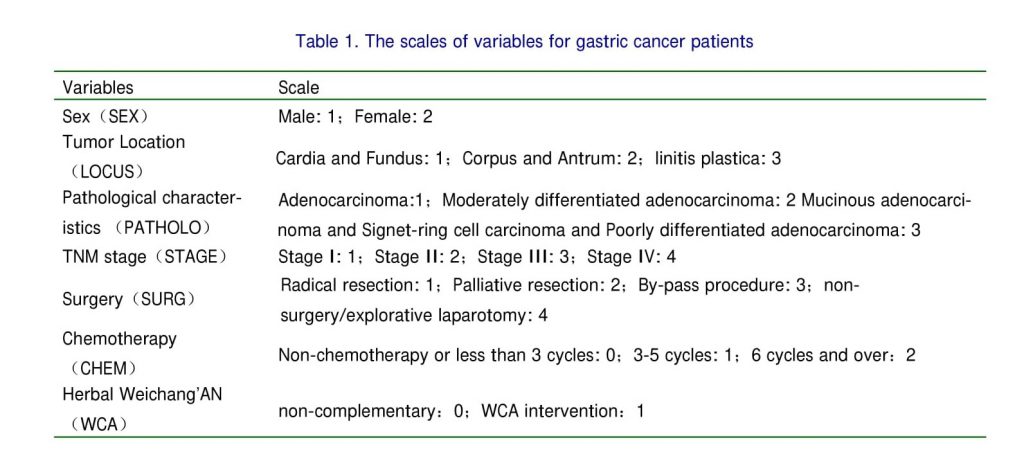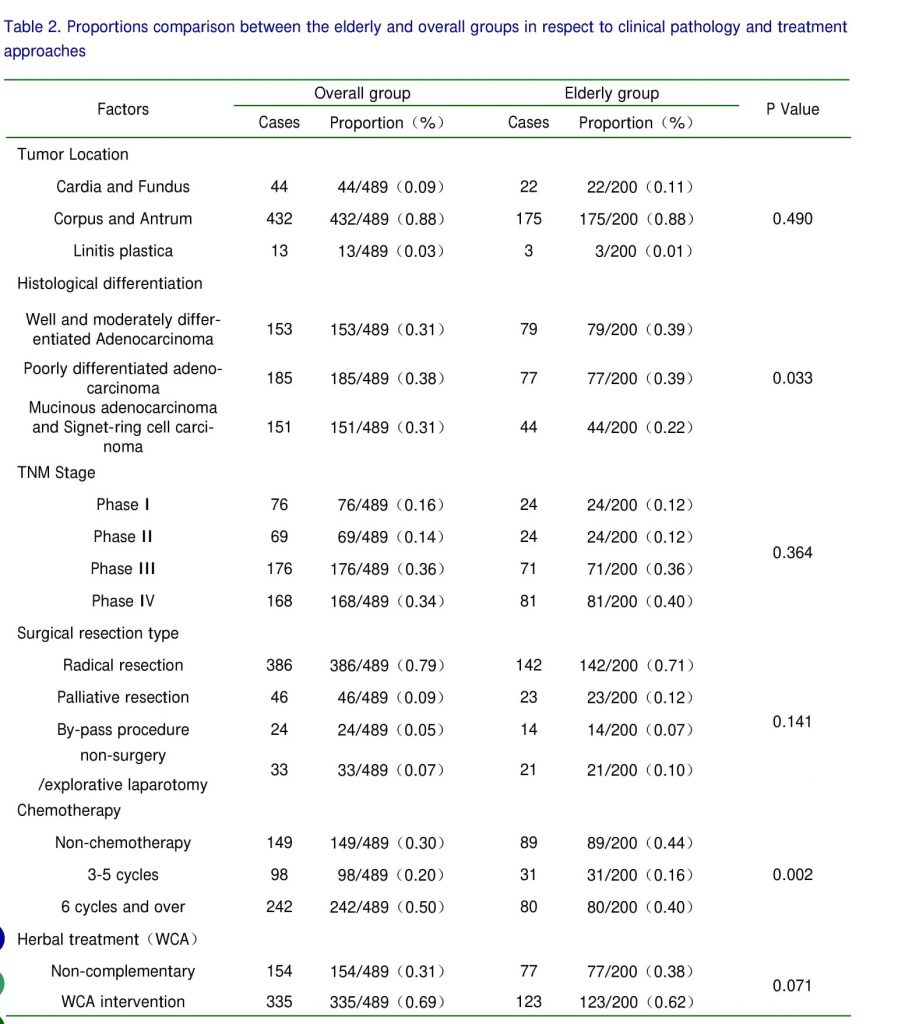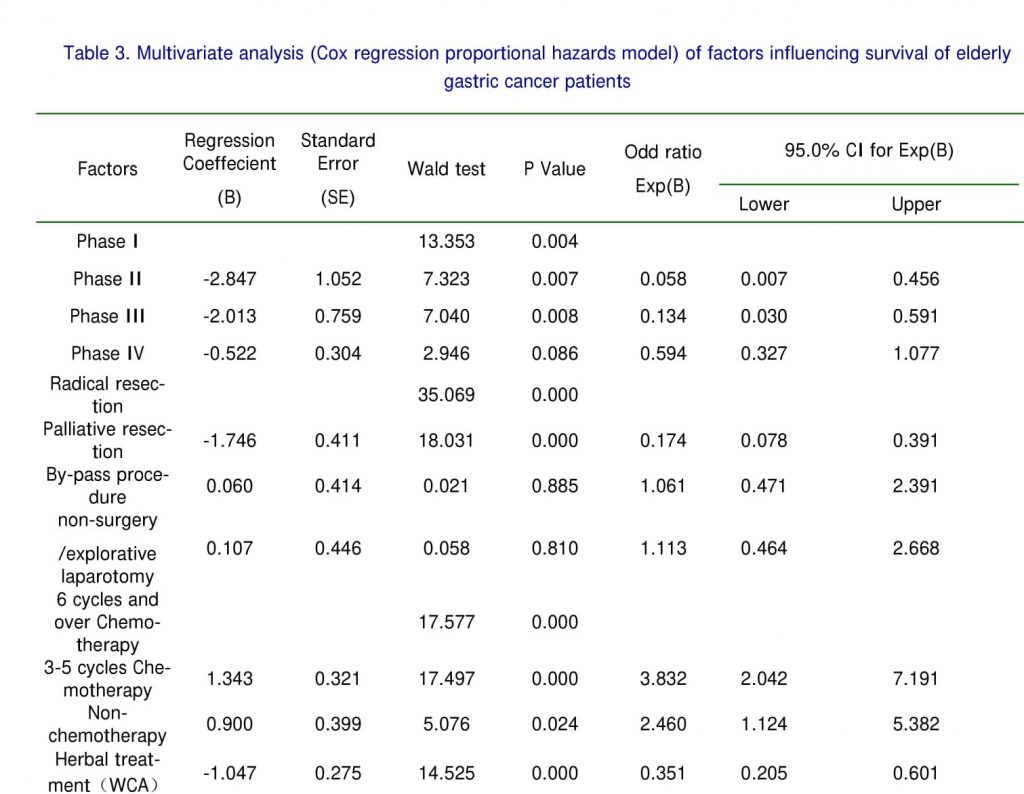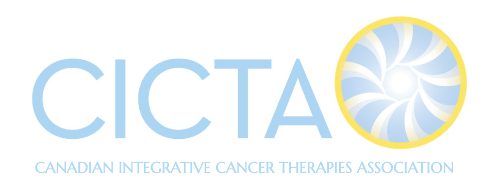Ai-Guang Zhao *, Yan Xu, Wei Yuan, Jian Zheng,
Jin-Zhu Yang, Ying Gu, Jin-Kun Yang, Lai-Di Tang
Department of Oncology, Longhua Hospital,
Shanghai University of Traditional Chinese Medicine, Shanghai 200032, China
Yong Cai, Department of Preventive medicine, School of Public Health,
Shanghai Jiaotong University, Shanghai 200025, China
ABSTRACT
OBJECTIVE To analyze the prognostic factors of 200 cases of geriatric gastric cancer, and further study the effect of Wei Chang’ An (WCA) herbal formula with Strengthening Spleen function and its modifications based on TCM differentiation syndromes in treatment and prognosis of elderly gastric cancer patients.
METHODS A retrospective study of 200 cases elderly group (age >60) out of 489 consecutive patients with gastric cancer was performed. The clinical data of the site of tumor, histological differentiation, clinical pathological classification, surgical resection type, chemotherapy and herbal intervention were statistically compared in elderly group and overall group. Univariate and Cox regressions were applied to analyze the influence of the pathological, surgical, chemotherapy and herbal WCA treatment variables on the prognosis of 200 elderly gastric cancer patients.
RESULTS The number of elderly group accounts for 41% of the total cases of gastric cancer studied. There is no difference with respect to the proportions of tumor location, clinical pathological classification, surgical resection type, and herbal intervention in the elderly group and the overall group (P values are over 0.05, Chi-square test). Mucinous adenocarcinoma and signet-ring cell carcinoma were rarely diagnosed; however, well differentiated adenocarcinoma and moderately differentiated adenocarcinoma were more common in elderly (P<0.05, Chi-square test). The cases of chemotherapy intervention and over 6 cycles chemotherapy in the elderly were less than that of overall group (P<0.05, Chi-square test). In univariate analysis, the significant prognostic factors were the TNM stage, surgical resection type, chemotherapy and WCA intervention. Cox regression multivariate analysis suggested that the TNM stage, surgical resection type, and WCA intervention were independent prognostic factors respectively (P<0.01). Patients who received WCA demonstrated better prognosis independent of other prognostic factors in multivariate analysis. The odds ratios [Exp(B)] of stage II, III and IV were 0.058 (95% CI: 0.007-0.456), 0.134 (95% CI: 0.030-0.591) and 0.594 (95% CI: 0.327-1.077), respectively. Exp(B) of palliative resection, by-pass procedure and non-surgery/explorative laparotomy were 0.174 (95% CI: 0.078-0.391), 1.061 (95% CI: 0.471-2.391) and 1.113 (95% CI: 0.464-2.668), respectively. Exp(B) of 3-5 cycles chemotherapy and non-chemotherapy were 3.832 (95% CI: 2.042-7.191) and 2.460 (95% CI: 1.124-5.382). Exp(B) of WCA was 0.351 (95% CI: 0.205-0.601). The tumor location and histological differentiation had no influence on survival in multivariate analysis (P>0.05).
CONCLUSION The degree of histological differentiation was relatively lower in elderly patients with gastric cancer. And the proportion of the patients requiring chemotherapy intervention was few. Wei Chang ‘An (WCA) herbal formula with Strengthening Spleen function and its modifications based on differentiation syndromes in treatment of elderly gastric cancer has an important value for improving the prognosis of gastric cancer.
INTRODUCTION
Gastric cancer is one of the most common malignancies and a second leading cause of cancer related death worldwide [1-3]. The number of patients aged 60 years and older accounts for 40% in the incidence of gastric cancer. The number of patients aged 65 to 75 years with gastric cancer is increasing [4]. The major problem is delayed diagnosis resulting in advanced cancer with multi-organ complications in the elderly patients. Although surgical resection is the most powerful tool to improve prognosis, however, for aged patients in particular, the benefits of surgical treatment and chemotherapy regimen have to be studied, and to evaluate integrative cancer therapy approaches and to further improve quality of life, there is a need for information on prognostic factors and contemporary results. The purpose of this study was to evaluate the effect of Wei Chang’ An (WCA) herbal formula with Strengthening Spleen function and its modifications based on TCM differentiation syndromes in treatment and prognosis of elderly gastric cancer by means of the overall survival rate calculation and multivariate analysis.
Diagnostic criteria
Gastric cancer was diagnosed based on the evidence of surgical resection or gastroscopy and pathological examination according to the Guidelines of Diagnosis and Treatment for Common Cancers in China, Ministry of Public Health, China.
Subject inclusion criteria
A) Patients diagnosed gastric cancer.
B) Tumor stage was registered according to 1997 the International Union Against Cancer (UICC) TNM staging system [5].
C) Non-specific age and sex.
Subject exclusion criteria
A) Pathological defined Adenosquamous Carcinoma, Squamous Cell Carcinoma, Carcinoid, Small Cell Carcinoma as well as Gastric Malignant Lymphoma, Gastrointestinal Stromal Tumors.
B) Tumor stage is deficiency according to 1997 the International Union Against Cancer (UICC) TNM staging system.
C) Patients with metastatic gastric carcinoma.
METHODS
Intervention approaches
A) Surgery resection type: Radical resection, Palliative resection, by-pass procedure or non-surgery.
B) Chemotherapy: chemotherapy regimen and therapy cycles completed.
C) Herbal formula Wei Chang’ An intervention: WCA is composed by Stir-fried Bai Zhu 12 g, Fu Ling 30 g, Hong Teng 30 g, Mu Li 30 g, Xia Ku Cao 9 g, decoction (infusion), 2-4 times daily, duration of use: in-patient 1 week, out-patient 2 weeks. Modifications are made based on differentiation syndromes, other single herb was added or removed from the formula.
Follow-up
Appointment follow-up visits, scheduled correspondence and questionnaire, telephone survey was carried out till the study termination date May 1st, 2007, or outcome and endpoints were well established.
Data handling and record keeping
A formatted paper patient record was adopted to collect clinical data including general information of the patients and transfer the data to computer Electronic Patient Record. The relevant variables are encoded to certain digital scores. Continuous variables are divided into quartile and ordinal rank scales (age excluded). Categorical variable in multivariate analysis is scaled into binary variables (Table 1). Overall Survival was established from the date of surgery or gastroscopy pathological characterization to death or the date of the last follow up visit by actuarial life -table method.
Statistical Analysis

Statistical analysis was carried out using the Statistical Package for the Social Sciences (SPSS13.0 for Windows). Proportions comparison was performed by squared chi test. Univariate analysis of overall survival rate was calculated according to the Kaplan-Meier method. The logrank test was used to compare survival data between groups. Multivariate analysis was performed using the Cox regression proportional hazards model.
RESULTS
The 489 cases of gastric cancer patients were included in this study. There were 302 men and 187 women. All patients with gastric cancer were positively diagnosed by pathological examination. Patients aged 60 years or older in total are 200 (148 men and 52 women), accounts for 41% of the overall studied cases.
Proportions comparison
There were no differences of proportions between the elderly and overall groups in respect to tumor location, pathological classification, surgical resection type and herbal treatment (P values are over 0.05, Chi-square test). Mucinous adenocarcinoma and signet-ring cell carcinoma were rarely diagnosed; however, well differentiated adenocarcinoma and moderately differentiated adenocarcinoma were more common in elderly (P<0.05, Chi-square test). The cases of chemotherapy intervention and over 6 cycles chemotherapy in the elderly were less than that of overall group (P<0.05, Chi-square test), see Table2.
Analysis of overall survival rate in the elderly cohort
Censored data are 116 out of 200 cases of the elderly patients, ranging in age from 60 to 83 years, account for 58%. Among them, 15 cases failed to be followed-up with the follow-up rate 92.5%. The overall 1-year, 3-year and 5-year survival rate are 68%, 55% and 51% respectively.

Univariate analysis of overall survival rate in the elderly patients
In univariate analysis, the significant prognostic factors were the TNM stage, surgical resection type, chemotherapy and WCA intervention. Meanwhile sex, tumor location and histological differentiation were not found to be impact factors of survival.

Multivariate analysis of overall survival rate in the elderly patients
Cox regression multivariate analysis suggested that the TNM stage, surgical resection type, and WCA intervention were independent prognostic factors respectively (P<0.01). Patients who received WCA demonstrated better prognosis independent of other prognostic factors in multivariate analysis. The odds ratios [Exp(B)] of stage II, III and IV were 0.058 (95% CI: 0.007-0.456), 0.134 (95% CI: 0.030-0.591) and 0.594 (95% CI: 0.327- 1.077), respectively. Exp(B) of palliative resection, by-pass procedure and non-surgery/ explorative laparotomy were 0.174 (95% CI: 0.078-0.391), 1.061 (95% CI: 0.471-2.391) and 1.113 (95% CI: 0.464-2.668), respectively. Exp(B) of 3-5 cycles chemotherapy and non-chemotherapy were 3.832 (95% CI: 2.042-7.191) and 2.460 (95% CI: 1.124-5.382). Exp(B) of WCA was 0.351 (95% CI: 0.205-0.601). The tumor location and histological differentiation had no influence on survival in multivariate analysis (P>0.05). See Table 3.
DISCUSSION
Gastric carcinoma is one of the most common malignancies in the world. Epidemiology study showed trends in incidence of gastric cancer is more frequent in old population, and it seems a high rate of morbidity and mortality in 60 years and over elderly patients. In this study, of the 489 cases, 200 are elderly patients aged 60 years and over, which accounts for 41%. Sex ratio (male to female) is of approximately 3:1 with male 148 and female 52, as seen in the reported data [4].
Gastric cancer in risk groups stratified by UICC pathologic Tumor-Node-Metastasis (pTNM) staging is well recognized independent prognostic factors [6,7]. Our data have been suggested that TNM stage is one of the independent prognostic factors which influencing survival of elderly gastric cancer patients.
Generally, the elderly is more susceptible to multi-organ chronic diseases, which resulting unacceptable or late gastroscopy and X-ray barium meal examination, as well as early mild symptoms of gastric cancer similar to certain gastrointestinal complications induced by variety of orally drugs leading to delayed diagnosis. Although proportion of stage I and II gastric cancer in elderly were less, while with more patients in stage IV, compared with overall group. There were no differences between the two groups in respect to TNM stage. Most cases were in stage III and IV, as seen from the high rate of 70% in this study. Our data indicated that advances made in early diagnosis are important strategies to make a difference in outcome of either elderly or younger gastric cancer patients.
There were no differences of proportions between the elderly and overall groups in respect to tumor locations. The study indicated that the frequent locations were similar in two groups and found to be over 80% morbidity in corpus and antrum. It has been reported that the incidence of gastric upper cancer in elderly was higher than younger. Our data confirmed that the proportion of elderly upper gastric cancer was slightly higher, however, there were no significant differences as compared with the overall data. With regard to histological differentiation, mucinous adenocarcinoma and signet-ring cell carcinoma were rarely diagnosed, on the contrary, well differentiated adenocarcinoma and moderately differentiated adenocarcinoma were more common in elderly (P<0.05) as reported. It is suggested that the elderly gastric carcinoma is likely to be well differentiated, possibly slowly advanced with a longer course of illness. Meanwhile tumor locations and histological differentiation were not found to be independent prognostic factors for elderly gastric cancer.
Further studies also showed elderly patients underwent surgery including radical resection, palliative resection and by-pass procedure or non-surgery/explorative laparotomy are similar to overall group with no great difference statistically. Surgical resection type is one of the independent prognostic factors which influencing survival of elderly gastric cancer patients in this multivariate Cox analysis. Similar findings were reported [8]. Our study revealed that surgical radical resection is the most powerful tool to improve prognosis in elderly patients. Since age was not an independent risk factor for gastric cancer patients undergoing surgical treatment, resection of gastric carcinoma remains the treatment of choice in elderly patients. Under the circumstance of impossible radical resection, palliative approaches can be applied to reduce tumor burden and advanced tumor associated complications minimally. Therefore, the balance of benefits can be reached by integrative oncology therapies.
With respect to chemotherapy, whether neoadjuvant chemotherapy for postoperative risk patients or aggressive chemotherapy for advanced cancer patients, to date, standard chemotherapy for gastric cancer has not been established so far. For this reason, a preliminary study on the prognosis impact of completed chemotherapy cycles. Upon proportions comparison, there were differences between two groups, with a lower number of patients who completed 6 or over cycles of chemotherapy in elderly (80/200), compared with in all included patients (242/489) (P<0.01). because of common complications in elderly gastric cancer patients, mostly chronic and degenerative diseases including respiratory (chronic bronchitis, pneumonitis), cardiovascular (hypertension, atherosclerosis heart disease, arrthymia), endocrine (diabetes, hyperlipidemia), these factors often make chemotherapy not well tolerated. Nevertheless, completed 6 or over cycles of chemotherapy in elderly gastric cancer patients is one of the independent prognostic factors which influencing survival in this multivariate Cox analysis. Hence, rational chemotherapy was recommended based on elderly individuals’ profile and rigorous examination of bone marrow, liver and kidney’s function was required to prevent adverse reactions. To successfully receive 6 cycles chemotherapy is also a primary measure to improve the prognosis of elderly gastric cancer.
In China, Chinese herbal medicine especially compound formula plays a pivotal role in gastric cancer care and management [9,10,11]. Our data indicated that Wei Chang’ An (WCA) herbal formula with Strengthening Spleen function and its modifications based on TCM differentiation syndromes in treatment of elderly gastric cancer is a protective factor of gastric prognosis. It is elucidated that herbal formula WCA exerts independent curative effect in integrative gastric cancer therapies. It was also verified by our previous overall retrospective case study [12].
Over a long-term study, based on “gastric cancer” mimic signs of the TCM theory of etiology and pathogenesis and holisticism as well as individualized Wei Chang’ An Formula differentiation syndromes principle integrated with western medicine foundation of gastric cancer development and clinical oncology, we proposed that the gastric cancer “root cause” is attributed to the “Spleen”, while the etiology and pathogenesis are associated with “Deficiency”, “Phlegm”, “stasis” and “toxin”. Especially, in terms of gastric cancer development and advance, deficiency of spleen and stomach is a dominant factor. Thus, a primary herbal formula Wei Chang’ An for the treatment of gastric cancer was introduced and claimed for clearing heat and dispelling toxin, softening hardness, and transforming phlegm on the basis of strengthening spleen and regulating Qi. Previous prospective randomized matched pair studies have been revealed the WCA improved the overall survival of advanced gastric cancer, with a higher survival rate and improved quality of life compared with MMF chemotherapy regimen [8]. The above-mentioned clinical findings were further verified that WCA was potent in the ENNG-induced linitis plastica dog model, a human gastric adenocarcinoma cell line SGC-7901 grafted subcutaneously nude mouse model and orthotopic transplant SGC-7902 nude mouse model [8,13,14]. Pharmacological studies showed that WCA can inhibit cancer cell proliferation, induce the apoptosis, and may be involved in aberrant expression of p53 and bcl-2 genes [15,16]. These results further revealed that WCA for the integrative treatment of elderly gastric cancer has positive and independent curative effectiveness.
On the basis of WCA over 20 years clinical practice it has been concluded that the use of TCM derived herbal formula WCA for the treatment of gastric cancer has the relative infrequency of significant demonstrable side-effects and may be beneficial for patients with dysfunction of liver and kidney and bone marrow suppression. Meanwhile, to date, no evidence was reported WCA has synergistic toxic side-effects or dismantles efficacy of chemotherapy agents. Therefore, clinically proven relative non-toxic herbal formula WCA as an integrative therapy approach based on TCM differentiation syndromes also can be employed.
CONCLUSION
The number of elderly gastric cancer is increasing gradually in China. Early detection and accurate diagnosis of cancer as well as adequate treatment are essential, and attention must be paid clinically. Under the circumstance of rigorous evaluation for the patient’s condition and positive treatment for complications, the integrative oncology therapy should be established by understanding of different stages of gastric cancer and primary surgery intervention. It is recommended that the early and middle stages of gastric cancer underwent radical resection of the tumors, while poor prognosis of advanced gastric cancer employed palliative cares of chemotherapy and TCM treatment etc. properly in order to prolong the life span and improve quality of life for the cancer patients.
REFERENCES
1. Lee J, Kang WK, Kwon JM, et al. Phase II trial of irinotecan plus oxaliplatin and 5-fluorouracil/leucovorin in patients with untreated metastatic gastric adenocarcinoma. Ann Oncol. 2007, 18(1):88-92.
2. Yilmaz U, Oztop I, Alacacioglu A, et a1. Irinotecan combined with infusional 5-fluorouracil and high dose leucovorin for the treatment of advanced gastric carcinoma as the first line chemotherapy. Chemotherapy 2006, 52(5): 264-270.
3. Van Cutsem E, Moiseyenko VM, Tjulandin S, et al. Phase Ⅲ study of docetaxel and cisplatin plus fluorouracil compared with cisplatin and fluorouracil as first-line therapy for advanced gastric cancer: a report of the V325 Study Group. J Clin Oncol 2006, 24: 4991-4997.
4. Orsenigo E, Tomajer V, Palo SD, et al. Impact of age on postoperative outcomes in 1118 gastric cancer patients undergoing surgical treatment. Gastric Cancer 2007,10 (1): 39-44.
5. Sobin LH, Wittekind CH, editors. TNM classification of malignant tumors. International Union Against Cancer (UICC), 5th ed. New York: Wiley-Liss; 1997. p. 59-62.
6. Earle CC, Maroun JA. Adjuvant chemotherapy after curative resection for gastric cancer in non-Asian patients: revisiting a meta-analysis of randomised trials. Eur J Cancer 1999, 35(7): 1059-1064.
7. Klein Kranenbarg E, Hermans J, van Krieken JH, van de Velde CJ. Evaluation of the 5th edition of the TNM classification for gastric cancer: improved prognostic value. Br J Cancer 2001, 84(1): 64-71.
8. Qiu JX, Jia JS,Yang JK,Zheng J, Zheng JG, Tang LD, Wang N, Shen KP, Pang HF, Ji GR, Qin DP, Li YM, Zhou XY, Luo XX, Liu MS, Qiu ZF, Cao LH, Dong MZ. Probing into the treatment of advanced stage of stomach carcinoma mainly by spleen-strengthening method. Zhongyi Zazhi 1992, 33(8):23-25
9. Borie F, Rigau V, Fingerhut A, Millat B Prognostic factors for early gastric cancer in France: Cox regression analysis of 332 cases. World J Surg 2004, 28(7): 686-691.
10. Yang JK, Zhen J, Shen KP. Clinical study on postoperative metastasis prevention of progressive stage of gastric cancer by Wei Chang’ An. Zhong Guo Zhong Xi Yi Jie He Za Zhi 2003, 23(8): 580-582.
11. Wang GT, Zhu JS, Xu WY, Wang Y, Zhou AG. Clinical and experimental studies on Fuzheng anti-cancer granula combined with chemotherapy in advanced gastric cancer. Shijie Huaren Xiaohua Zazhi 1998, 6(3):214-218.
12. Zhao AG, Cai Y, Yang JK, Zheng J, Shen KP. Effect of Chinese Jianpi herbs on prognosis of gastric cancer. Shijie Huaren Xiaohua Zazhi 2005, 13(9):1055-1058.
13. Zhao AG, Jin XJ, Yang JK, et al. Effects of Chinese Jianpi herbs on cell apoptosis and related gene expression in human gastric cancer grafted onto nude mice. World J Gastroenterology 2002, 8(5): 792-796.
14. Zhen JG, Zhao AG, GuY, et al. Inhibition of Tumor Cell Proliferation and Induction of Apoptosis in Orthotopic Transplanted Gastric Cancer SGC-7901 by Wei Chang An. Chinese Journal of Gastroenterology 2006, 11(6): 336-339.
15. Zhao A, Yang J, You S, Li T, Zhao H, Gu Y, Tang L, Qiu J. The Difference of Gene Expression Profile in Human Gastric Cancer Grafted onto Nude Mice Treated With WCA. Ann Oncol. 2006, 7(Supple 6): vi54.
16. Zhao AG, Zhao HL, Yang JK, et al. cDNA Array in the Exploration of the Effect of Chinese Compound of Strengthening Spleen on Gene Expression of Gastric Carcinoma. Chinese Journal of Integrated Traditional and Western Medicine on Digestion. 2004, 12(2): 67-70.
Correspondence to:
Dr. Ai-Guang Zhao
Department of Oncology, Longhua Hospital, Shanghai University of Traditional Chinese
Medicine, 725 Wanping Nanlu, Shanghai 200032, China.
Email: aiguang@hotmail.com
Telephone: +86-21-64385700×3722
Fax: +86-21-64398310

